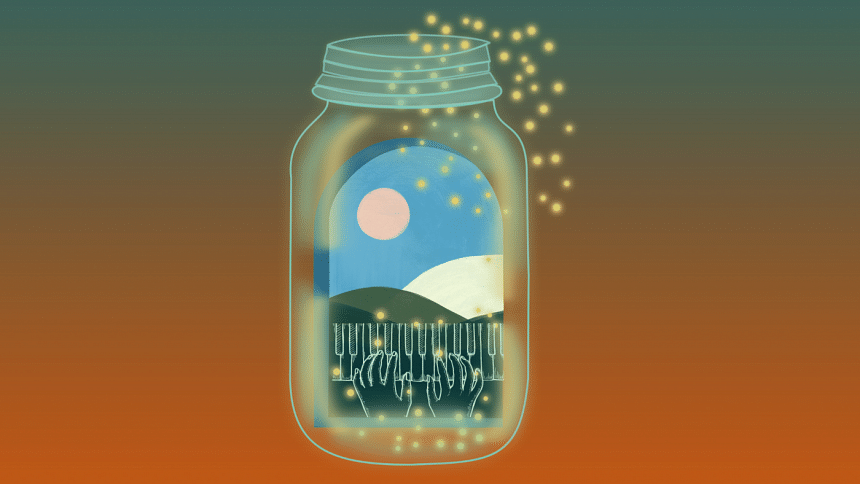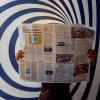Mason Jar

Another night spent awaiting the sunrise. I look out my window facing a mesh of red, orange, yellow hues against a vast, cerulean canvas. I must disagree with the poets. Each morning, it is the same, in its staggeringly tedious white-on-blue enormity, it is the same sky.
The trophy I had wanted since childhood sits menacingly on the shelf. I blink, hoping it might take a brand-new shape. But it remains, the solid object I brought home a few weeks ago. The same hunk of metal and wood moulded into a gramophone, grand and golden, with "FIRST PLACE" engraved on its side like letters on a tombstone.
I stare bleary eyed as my lock screen tells me I have a new message.
"I'm so proud of you, Abrar! I always knew you'd win. There's nothing you can't do! I promise, it will only get better from here."
"Thank you for your kind words." My fingers type out and hit send.
In the past few days, my body has learnt five different ways to reflexively thank someone – automated responses to all my well-wishers.
My mother is upset that I have not sat at the piano since the competition. Initially she assumed I had been rewarding myself with a small break. Now she notices the hollow in my eyes. She notices my untouched meals and unkempt hair. Soon she will come into my room to remind me of my gift. She will ask me why I run from it, now of all times.
How can I explain that playing the piano feels like racing towards nothing? I have no new shinier trophy to set my eyes on. I have no grand title to chase.
My father had bought me my piano when I was a child, and I had longed to master the instrument since. Multiple tutors and hundreds of practice sessions passed when the true reach of my talents began to unfold. Once I found out about the competition in Prague, the course of my life was set.
After years of hard work, a few months ago I finally secured a spot in the competition. And so, my mother and I flew out to Prague a month beforehand. Only one thing stood before my mind's eye: a prize that would be a testimony for my entire career. Each day I would sit at my piano by the window until I knew the Double Thirds Etude like the back of my hand. Each night I would know no sleep. I would stare down at the keys until they'd stared back at me. Stoic expressions on their dull, dead faces. I wouldn't stop until I brought them to life.
On the fateful night, my mind was not my own. A stranger, in a strange theatre of a strange city, wandering in a stranger's body, I drifted in place. As they called my name, I fought down a bout of nausea and entered the stage. Each moment of my life had been cascading towards this point. I felt the burden of a thousand eyes on me, a thousand ears prepared to hear the verdict of whether I would pass on my own life. A hundred flashing lights. Rapturous applause followed by a silence that hung by a thread. My fingers edged towards the keys, approached the final chapter of my biography as I pressed down, an alien note emanating from the piano and drifting into my ears.
With the final key I signed my sentence, either to ascend or to die. Or both.
Towards the end of the night they announced that I had won.
I heard no applause nor cheer. Backstage, I gave in to the bout of nausea and allowed my insides to empty themselves of bile. I let go of the fear, told myself I had finally done it. My dream was finally in the palm of my hands, with nowhere else to put it.
My book has been written, the epilogue closed. I am standing on the other side of my biography. I read through the pages, relive the scenes that brought me all my glory. I have now become a container for the past; a mason jar to hold all my memories in place.
Waziha Aziz is a really loud person with an inflated sense of self. Remind her that she's not all that via Instagram @useless_depressing_poetry.

 For all latest news, follow The Daily Star's Google News channel.
For all latest news, follow The Daily Star's Google News channel. 








Comments